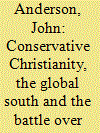| Srl | Item |
| 1 |
ID:
108096


|
|
|
|
|
| Publication |
2011.
|
| Summary/Abstract |
This article explores conservative Christian contributions to debates over sexual orientation, focusing in particular on the way in which Northern Christians struggling to win their battles at home look to the global South for allies and support. This is made easier by the fact that global Christianity is once more overwhelmingly a Southern religion that generally adheres to traditionalist understandings in the sphere of sexual relations. The article looks at how this has played out at church, state and international levels by examining the conflicts over sexuality within the Anglican Communion, the domestic and international debates about the controversial Ugandan draft law on homosexuality, and discussions about sexual orientation in UN institutions. It concludes by rejecting simplistic suggestions that these are part of a one-way process, in which Northern conservatives use their counterparts in the global South to promote their own agendas.
|
|
|
|
|
|
|
|
|
|
|
|
|
|
|
|
| 2 |
ID:
193013


|
|
|
|
|
| Summary/Abstract |
This article explores the everyday political economy of the Catholic World Youth Day in Panama, which was organized in January 2019. The aim is to shed more light on the relationship between the market and the religious sphere and, in particular, on the everyday experience of the WYD participants, and their encounters with the market and market practices. In doing so, the article challenges several commonly held assumptions, such as the priority of religious doctrine over everyday practices and the belief that the religious sphere is one-sidedly colonized by the market. Instead, the article shows that in this case, the interactions between the church and the market played out differently in three different areas – the discursive critique of the market by the Church leaders, the Church’s incorporation of market practices in its activities and the alliance between the local Catholic organizers and businesses. In the end, the complex interactions between the participants, businesses, discourses, spaces and technologies gave rise to a unique sacred-market network which blurred and at times entirely erased the difference between the religious sphere and the market.
|
|
|
|
|
|
|
|
|
|
|
|
|
|
|
|